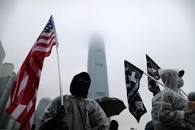HONG KONG (Reuters) – Hong Kong will end 2019 with multiple protests planned for New Year’s Eve and New Year’s Day aimed at disrupting festivities and shopping in the Asian financial hub, which has seen a rise in clashes between police and protesters since Christmas.
Events dubbed “Suck the Eve” and “Shop With You” are set for New Year’s Eve on Tuesday in areas including the party district of Lan Kwai Fong, the picturesque Victoria Harbour, and popular shopping malls, according to notices on social media.
A pro-democracy march on Jan. 1 has been given police permission and will start from a large park in bustling Causeway Bay and end in the central business district.
Organisers Civil Human Rights Front were behind the peaceful million-plus marches in June and held a mass protest earlier in December, which they said around 800,000 people attended.
“On New Year’s Day, we need to show our solidarity … to resist the government. We hope Hong Kong people will come onto the streets for Hong Kong’s future,” said Jimmy Sham, a leader of the group.
The protests began in June in response to a now-withdrawn bill that would have allowed extraditions to mainland China, where courts are controlled by the Communist Party, and have evolved into a broader pro-democracy movement.
Police said they would deploy crowd control patrols on Tuesday and urged marchers on Wednesday to remain peaceful.
In a Facebook post, Police Commissioner Chris Tang thanked his frontline officers for guarding Hong Kong’s “safety and stability” and issued a warning to protesters.
“If you use violence, you will not get public support. We, police, will do all we can to arrest you,” Tang said.
The demonstrations planned for New Year follow a pick up in clashes since Christmas Eve, when riot police fired tear gas at thousands of protesters following scuffles in shopping malls and in a prime tourist district.
While the protests — now in their seventh month — have lessened in intensity and size in recent weeks, marches or rallies continue to occur almost daily.
A rally is planned in the central district on Monday night to remember people killed or injured during the protests.
More than 2,000 protesters have been injured since June.
Police arrested 34 over the weekend and used pepper spray to break up a gathering aimed at disrupting retail business near the border with mainland China.
More than 6,000 protesters have been arrested since challenges began to the extradition bill, seen as an example of meddling by Beijing in freedoms promised to the special administrative region when Britain returned Hong Kong to China in 1997.
China denies the claims and says it is committed to the “one country, two systems” formula put in place at that time, and blames foreign countries including Britain and the United States for inciting unrest.
The protests have battered Hong Kong’s economy, already reeling from the fallout of the U.S.-China trade war. Trade figures on Monday showed exports falling 1.4% year-on-year in November and imports dropping 5.8%, with both set for a clean sweep of negative monthly figures in 2019.

Paul Chan, the city’s financial secretary, said on Sunday that a fall in GDP in the fourth quarter was “unavoidable”.
To alleviate the “pain” of the economic downturn, he said the government’s budget in February would focus on boosting the economy, protecting unemployment and easing the “plight” of the people and enterprises.
Reporting by Clare Jim; Writing by Farah Master, Marius Zaharia; Editing by Catherine Evans
Credit: Source Link